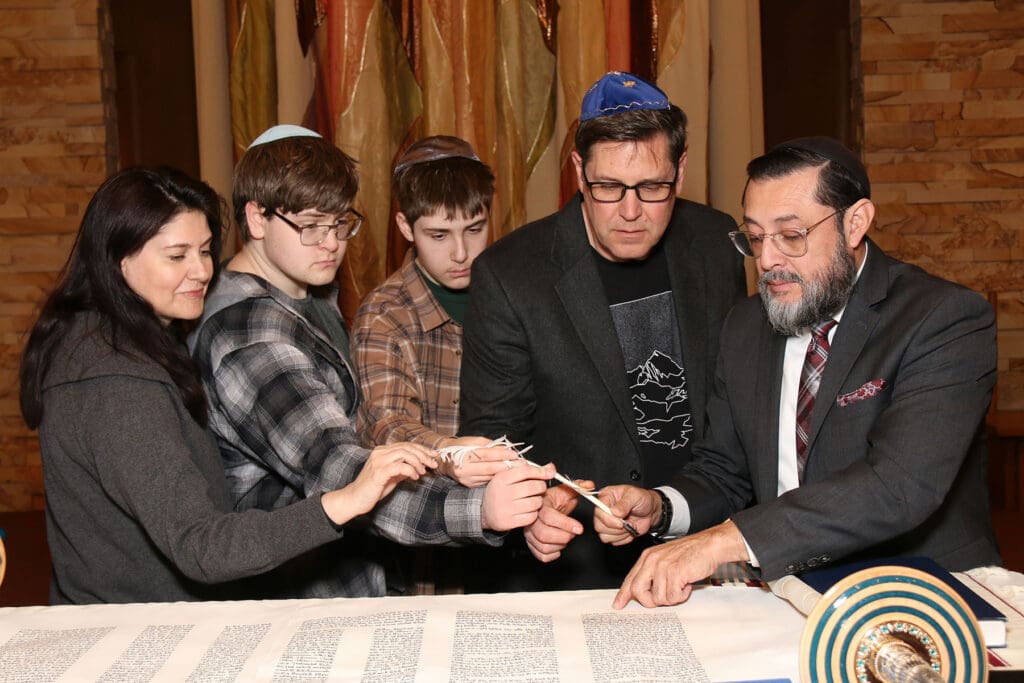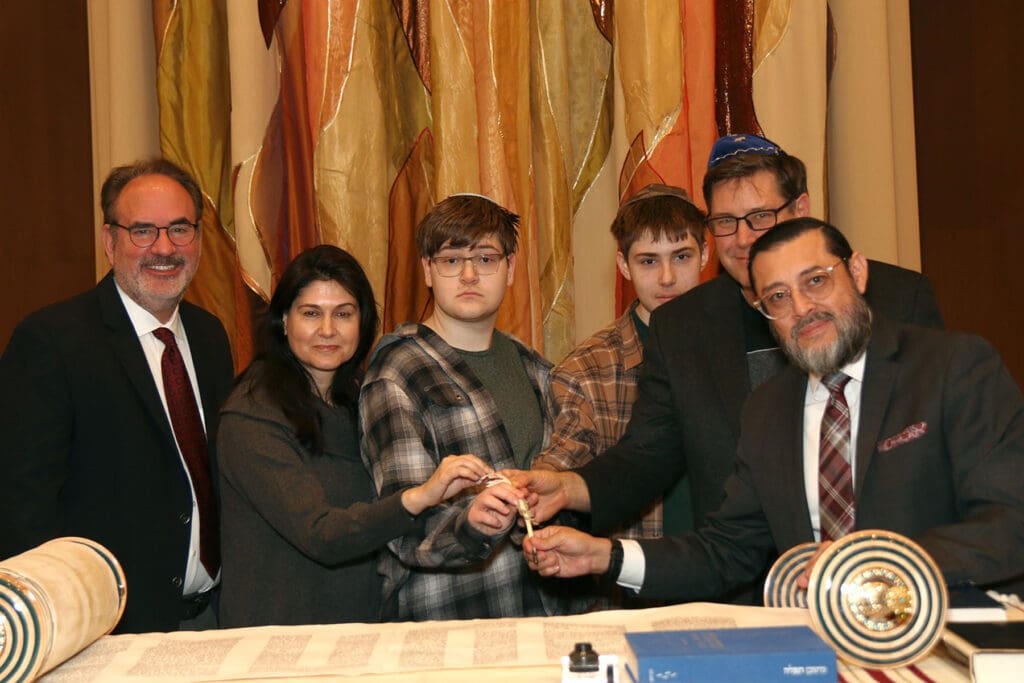

Shirli Brautbar
SUMMARY OF Numbers 8:1-12:16
The Appointment of the Levites
Numbers 8:1-26
Our portion begins with God instructing Aaron, via Moses, to kindle the Menorah lamp in the Tabernacle so that each light points towards the face of the Menorah. The Menorah itself, we are reminded, is hammered from a single piece of gold.
The Israel Bible points out the connection between Aaron and the story of Chanukkah, hundreds of years later. When the Syrian-Greeks sought to wipe out Judaism in the Holy Land, the Maccabees fought back. Miraculously defeating an enemy who greatly outnumbered them, the Maccabees, who were of priestly descent, searched high and low for pure olive oil with which to light the Menorah as their ancestor, Aaron, had been commanded that it should be lit daily. Only one small vial, containing enough oil to burn for one day remained. It would take eight days to procure more. The Maccabees lit the lamp regardless and another miracle occurred. The oil continued to burn all eight days! Thus, Jews worldwide light Chanukkah candles for eight days each year in commemoration.
The next 22 verses detail the sanctification of the Levites for their work. As mentioned earlier in the portion of Bamidbar (see Numbers 3:40-51), God selected the Levites to replace the firstborn sons in His service in the Tabernacle. Now, He describes the ceremony of their appointment.
For purification, they are to be sprinkled with purifying water and shaved. Their clothes are to be immersed. They must bring two bulls as offerings and stand before the Tent of Meeting. The Israelites are to lean their hands upon the Levites and then Aaron is to wave the Levites as a wave offering. The Levites, in turn, place their hands upon the bulls, which are then brought as a sin offering and elevation offering respectively. The Torah relates that the dedication of the Levites is carried out as commanded.
God also dictates that the Levites serve in a supporting role in the Tabernacle from the age of 25 to 50. However, the Levites must not perform the work which is commanded to the priests.
Passover in the Desert
Numbers 9:1-14
One year after the exodus from Egypt, God tells the people they must celebrate Passover. It is the beginning of their second year in the wilderness. On the fourteenth day of the first month, they perform the Passover sacrifice as commanded, but not everyone is able to participate. Some members of the community had become impure due to contact with the dead and ask how they might be able to fulfil their own obligations in the Passover sacrifice. Moses brings their question before God, who tells them those who, through no fault of their own, are not able to attend the communal sacrifice on the fourteenth of the first month, may perform it one month later. If, however, he was able to attend and did not, such a person is punishable by excision.
The Israel Bible notes that while the people celebrated Passover, the holiday of freedom, their freedom was not yet complete, as they had not yet arrived in the Promised Land. People are only truly free when they live under their own rule. Thus, each year at the Passover seder, the words “Next year in Jerusalem” are recited.
Traveling the Desert
Numbers 9:15-10:36
Now the Torah describes the process of the people’s journeys through the wilderness. We are told that once the Tabernacle was erected in the camp, the cloud of God’s Glory would settle upon it. When the cloud lifted off the Tabernacle, it was a sign the time had come to travel again. The people would camp or travel according to the dictates of God. Sometimes they would camp briefly, other times for an extended period, but always in concert with God’s wishes.
God also orders two silver trumpets to be made, and tells how to use them to signal the camp. A long blast on both trumpets calls the community together. A long blast with only one is a signal to the leaders to assemble. Short blasts tell each camp in turn that the time has come to travel. The trumpets are to be blown by Aaron and his descendents.
In addition to signaling assembly and travel, the trumpets are to be blown for war, celebrations and over sacrifices.
On the twentieth day of the second month of the second year, the newly organized camp of Israel leaves Mount Sinai and travels in formation for the first time. The camp of Judah travels first, followed by the families of Gershon and Merrari, bearing the parts of the Tabernacle. Next the camp of Reuben sets out, followed by the family of Kehat with the holy vessels. They are to reassemble the Tabernacle at the next camp site. Next comes the camp of Ephraim, and finally that of Dan.
Before leaving, Moses invites his father-in-law (here called Hobab, one of the many names by which Jethro is known in the Bible) to join the people in their journeys, but he turns down the offer. Undaunted by the refusal, Moses begs him to reconsider. The Torah does not relate Jethro’s final decision.
This first journey lasts three days. As this first journey draws to a close, we are told of the words Moses would recite during their travels, lock-step with the movement of the Ark: “Rise up, O LORD, and let Thine enemies be scattered; and let them that hate Thee flee before Thee.” When the Ark would come to a stop, he would say: “Return, O LORD, unto the ten thousands of the families of Israel.” (Numbers 10:35-36) The Israel Bible reminds us that the Ark served as a constant reminder of God’s presence in the camp, and was therefore its focal point. It contained the Tablets of the Law. Today, too, the Bible must remain the focal point of our lives.
The People’s Complaints
Number 11:1-35
Here begins a dark chapter in the Israelites’ journey, foreshadowing worse to come next week. The Torah tells of not one, but two complaints the people level against God and Moses. The first is left to the reader’s imagination, and we are only told that God becomes angry and a fire spreads through the edge of the camp. The people cry out and Moses prays to God, and then the fire stops. They name the place Tav’erah, meaning “burning”.
The second incident begins with the mixed multitude of people who had left Egypt with the Israelites lusting for meat. Rejecting the miraculous Manna which fell daily from Heaven, the people cry out for the “luxuries” they remember from Egypt: fish, cucumbers, watermelon, leeks, onions and garlic. This ingratitude incenses both God and Moses.
Moses turns to God, asking why He has inflicted this people upon him. God tells him to gather 70 wise men from the tribes to help him bear the burden of the people. He likewise says He will give the people the meat they crave until they are sorry they asked for it.
Moses cannot conceive of finding that much meat in the desert, but God reminds him that He is the Almighty and there is nothing He cannot accomplish.
Moses gathers the elders as requested, and God rests His spirit upon them, rendering them temporarily capable of prophecy. Meanwhile, two others who were not present also receive the spirit of God from within the camp, and begin to recite prophecies as well. Moses’s faithful student, Joshua, wishes to incarcerate the two, as he sees their actions as rebellious, but Moses admires their righteousness in being conduits for prophecy and tells Joshua to stand down.
When Moses and the elders return to the camp, a wind begins to blow, covering the camp in quail. The people spend two days and one night gathering the quail. While the people are still eating the quail, God lashes out at them in anger. They name the place Kivrot Hata’ava, meaning “the graves of lust”.
From there, they travel on to Hazeroth.
Miriam and Aaron Speak Ill of Moses
Numbers 12:1-16
An unusual incident is now related, in which Miriam and Aaron speak poorly of their brother, particularly about his choice of wife. After all, they say, doesn’t God speak to us, too?
God is displeased with the disrespect the pair are showing towards their brother, so he calls them all to the Tabernacle. He demonstrates to Miriam and Aaron that His relationship to Moses is, in fact, unique, and in His anger, strikes Miriam with tzaraat, commonly translated as leprosy. As a priest, Aaron is forced to diagnose his sister’s condition.
The Israel Bible elaborates on the uniqueness of Moses’s prophecy, according to Jewish tradition. Other prophets would receive images or dreams from God, and would have to communicate them in their own words. Although the content was divine, the form was man-made. Moses, on the other hand, spoke to God “face-to-face”. Therefore, the Torah is not just divine in content, but also in form.
Aaron begs his brother’s forgiveness, asking him to intercede with God on their sister’s behalf. Moses prays for her recovery, but God says she must allow the spiritual affliction to run its course. The entire camp of Israel waits for Miriam to be purified and rejoin them before moving on to the Paran Desert.
